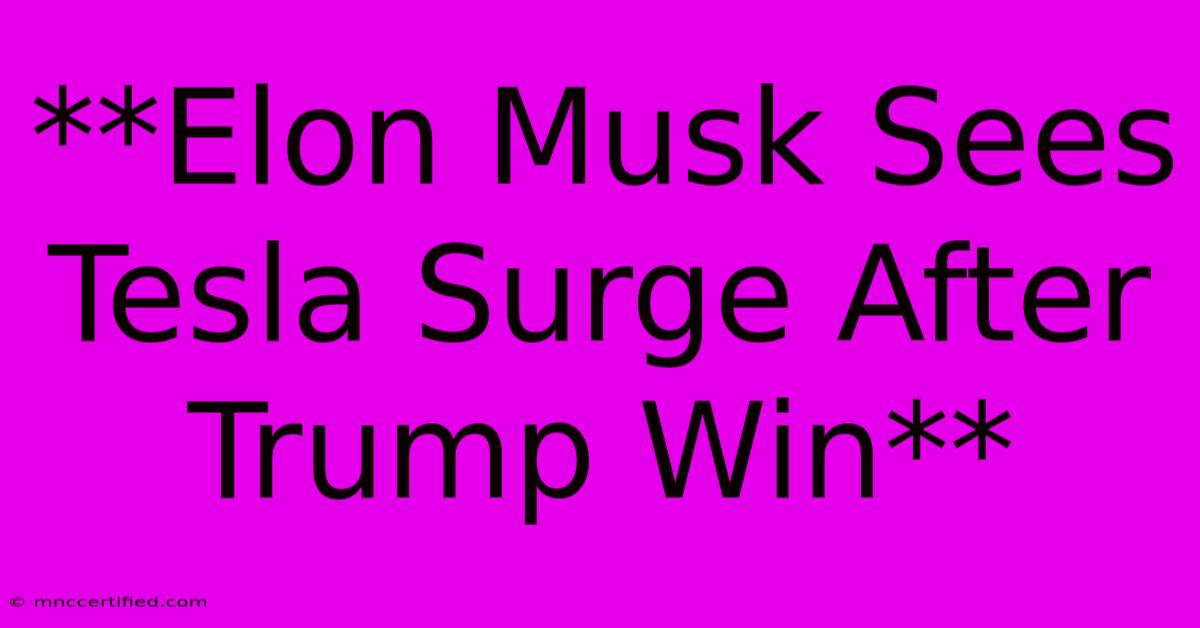**Elon Musk Sees Tesla Surge After Trump Win**

Table of Contents
Elon Musk Sees Tesla Surge After Trump Win: A Look at the Impact
The 2016 US Presidential election saw a dramatic shift in the political landscape, with Donald Trump's victory shaking up various industries, including the automotive sector. Notably, Tesla, led by the eccentric entrepreneur Elon Musk, experienced a significant surge in its stock price following Trump's win. This article delves into the reasons behind this surge and examines the potential impact of Trump's policies on Tesla's future.
Trump's Policies and Tesla's Potential Gains
Several factors contributed to the positive sentiment surrounding Tesla after Trump's victory:
- Focus on American Manufacturing: Trump campaigned on a promise to revitalize American manufacturing and bring jobs back to the US. This resonated with investors who saw Tesla's commitment to domestic production as aligning with Trump's agenda.
- Relaxed Environmental Regulations: Trump's stance on environmental regulations, particularly those related to fuel efficiency and emissions, was viewed favorably by Tesla. The company, known for its electric vehicles, stood to benefit from less stringent regulations and potentially lower manufacturing costs.
- Tax Cuts and Incentives: Trump's tax cuts were seen as a potential boost for Tesla, reducing the company's tax burden and freeing up resources for expansion and innovation. Additionally, potential incentives for electric vehicle adoption were expected to benefit Tesla's sales.
Tesla's Stock Performance After Trump's Win
Following Trump's election victory, Tesla's stock price soared, reaching an all-time high in 2017. This reflected the market's optimistic view of the company's future under Trump's policies. However, the stock's performance has been more volatile in recent years, reflecting concerns about Tesla's production challenges, financial performance, and Musk's erratic behavior.
Long-Term Implications for Tesla
While Trump's policies initially appeared beneficial for Tesla, the long-term impact is still being debated. The company faces several challenges, including:
- Competition: Tesla faces increasing competition from established automakers like Ford and General Motors, as well as new entrants like Rivian and Lucid Motors.
- Production and Quality Control: Tesla has faced significant challenges in ramping up production and ensuring consistent quality control, which has impacted profitability.
- Musk's Leadership: Musk's erratic behavior and controversial tweets have raised concerns among investors and analysts.
Conclusion: Navigating a Volatile Landscape
The relationship between Tesla and the Trump administration was complex and multifaceted. While Trump's policies initially seemed favorable for the company, the future remains uncertain. Tesla's success will depend on its ability to navigate the evolving landscape of the automotive industry, address production challenges, and maintain investor confidence.
Keywords: Tesla, Elon Musk, Trump, stock price, electric vehicles, environmental regulations, manufacturing, competition, production, leadership, impact, future.

Thank you for visiting our website wich cover about **Elon Musk Sees Tesla Surge After Trump Win**. We hope the information provided has been useful to you. Feel free to contact us if you have any questions or need further assistance. See you next time and dont miss to bookmark.
Featured Posts
-
Flick Penas Impact Gavis Development
Nov 07, 2024
-
2025 Inauguration Date Trumps Plans
Nov 07, 2024
-
Ferrous Processing And Trading Co Canton Llc
Nov 07, 2024
-
Is A Septorhinoplasty Covered By Insurance
Nov 07, 2024
-
Barca Wins Big Estrella Roja 2 5 Extends Winning Run
Nov 07, 2024